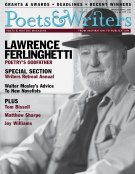It was the end of summer on the Upper Peninsula. The leaves around the port city of Escanaba would turn soon and the waters of Lake Michigan would grow cold and choppy as winter rolled in. Tom Bissell was sitting at his dad's house, holding his head in his hands. Things were not going well. They were not going according to plan.
The year was 1996, and Bissell was just back from an abbreviated stint in the Peace Corps, working in the former Soviet republic of Uzbekistan. After only eight months, after falling down a deep well of depression, after struggling to teach English, after watching his adopted puppy die in his arms on his twenty-third birthday, and after writing letters home in which he ominously referred to an imaginary friend named Blackmind, Bissell says, he came home early.
No one was very happy about this. Not him. Not his family. "Everyone told me I'd fucked up, that I wasn't tough enough, that I should have stuck it out," Bissell recalls. Back in Escanaba—a cold, tough, industrial town with long, Siberian winters—he realized he had to do something, even if it wasn't part of the plan. So he applied for a job at the local paper mill.
"They got three applications. I think they interviewed two people. I was one of them. I didn't get the job," Bissell says. "When I found out I didn't get the job, I thought, ‘I am so fucked!' I had no clue what I was going to do."
This wasn't how he'd pictured things when he'd finished college and sent off his applications to MFA programs—all of which had rejected him. This wasn't how he'd pictured things when he'd boarded the plane for central Asia. The future was suddenly very fuzzy. But it was about to come into focus.
After he'd come home from the Peace Corps, Bissell had sent an application to an internship program in New York City at Harper's Magazine, which he had been reading since high school. "I figured I had a cat's chance in hell of ever hearing from them," he says. But a few days after getting word that the paper mill had chosen a more suitable candidate, Bissell was sitting at home nursing a serious existential crisis when the phone rang. The answering machine picked up. "Hi," said the message, "this is Susan Burton from Harper's.…" Bissell ran to the phone. They wanted to interview him.
"I may have set the world record for driving from Michigan to New York," he says.
And so, as Tom Bissell raced east, things were becoming a little clearer. But there were still many things he didn't know. He didn't know that in a few years, he would end up working as an editor at Henry Holt. He didn't know that as a freelance writer, he would land bylines in the Believer, the Boston Review, Esquire, Harper's, and Men's Health. He didn't know that his work would appear in The Best American Travel Writing three times, The Best American Science Writing, and The Best American Short Stories, or that he would end up as a contributing editor at both Harper's and the Virginia Quarterly Review, or that he would win a Rome Fellowship from the American Academy of Arts and Letters.
And he had no way of knowing that by now he would be touring for his fourth book, The Father of All Things: A Marine, His Son, and the Legacy of Vietnam, a memoir published this month by Pantheon Books that is a meditation on war and what it does to those fighting it—specifically Bissell's father, John, who served as a lieutenant and was injured in Vietnam before the author was even born.
It is just over a thousand miles from Escanaba to New York City, but for Tom Bissell, it was actually much farther than that. He'd wanted to be a writer since he was young, a notion he'd first gotten from two of his father's good friends: best-selling memoirist, fiction writer, and journalist Philip Caputo, who was in the Marines with John, and poet and fiction writer Jim Harrison, whom Caputo introduced to the Bissell family. "They would turn up every year at my house," says Bissell, "and were in my life at a pretty young age. I'm sure if it weren't for those two, I never would have gotten interested in writing to the degree that I did."








